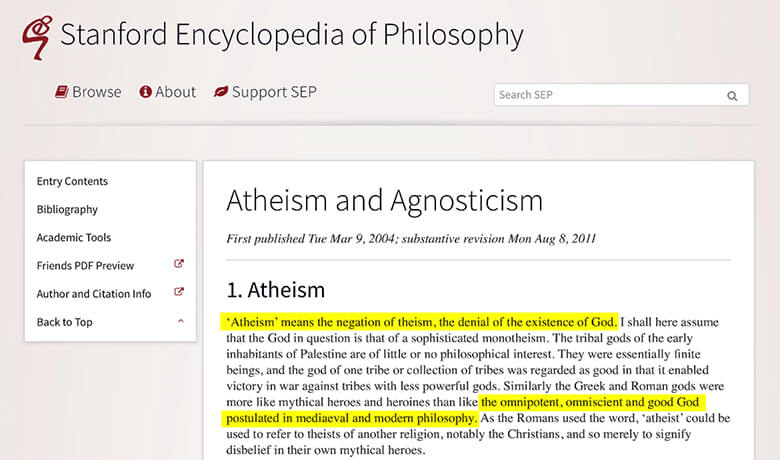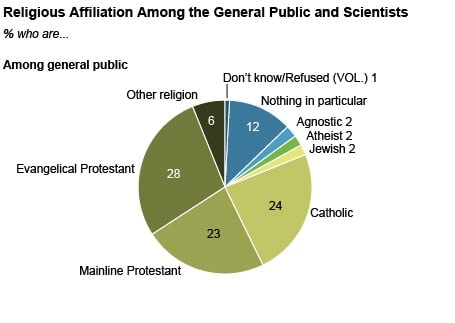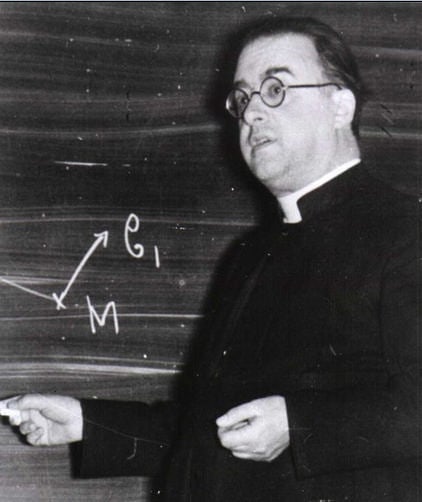EDITOR’S WARNING: Some may find this post upsetting, as it challenges several deeply-held beliefs. If you are an atheist, and you’re sensitive to critiques of atheism, then we encourage you to leave this page immediately. Thank you. – Right Smarts Staff
The infamous German philosopher Friedrich Nietzsche had a favorite saying, “Gott ist tot.” Translated into English, this is the highly provocative claim that “God is dead.”
I’ve got some bad news for Mr. Nietzsche (or would have, if he hadn’t died over a century ago) . . .
God is not dead. In fact, not only is God not dead, the evidence for God’s existence is overwhelming. So much so that the only thing which can be said to be dead is atheism. Which is where I come in.
Atheism is dead.
Consider the rest of this post its port mortem.
Okay Atheism Is Dead, But What Is Atheism?
Many people find this confusing, so let’s get it out of the way early.
Atheism is not “a lack of belief in God,” as atheists are so fond of saying. If you lack belief in God, but don’t deny God’s existence, you’re agnostic (neutral position), not atheist (negative position).
Atheism is the explicit denial of God’s existence.

The term has been used this way for centuries. It’s how the term’s defined by dictionaries, and by authoritative encyclopedias, like the Stanford Encyclopedia of Philosophy. Most telling of all, it’s how atheists (including Richard Dawkins in The God Delusion) use the term.
That is, until they’re put on the defense. When that happens, they immediately retreat into agnosticism . . .
You see, the conflation of atheism and agnosticism is a recent trend of so-called “new atheists.” Those stereotypical atheists who may or may not have neckbeards, wear fedoras, and carry themselves with an unwarranted sense of arrogance . . . You know the ones.
It’s little more than a cheap rhetorical device; a way to hide the fact that they have nothing of substance to offer.
There is zero compelling evidence for atheism. If there were, then atheists would be quick to point it out.
When asked to defend it atheists must play make-believe agnostics, retreating into the safe space of neutrality. This allows them to dodge their own burden of proof: offering a stronger explanation for existence than God. (this isn’t to say theists don’t also have a burden of proof. Of course they do.)
Anyone who’s ever had debated an atheist knows exactly what I’m talking about.
Atheist “God does not exist, you stupid theist!”
Theist: “If you say God doesn’t exist, what evidence do you have for God not existing, and for a better explanation for existence?”
Atheist: “I don’t need evidence, I merely lack belief in God’s existence.”
Explicit denial of God’s existence (atheism) when on the attack. Then they get challenged. Then they retreat into lack of belief in God (agnosticism) when on the defense.
It’s a textbook bait-and-switch tactic.
There is a secondary motivation for conflating atheism and agnosticism: to inflate the number of atheists.
Think about it . . .
If simply lacking belief in God makes one an atheist, then all agnostics are atheists. And if all agnostics are atheists? The U.S. (and the world) has a lot more atheists than we thought.
Take a look at this 2009 research on religious belief in the United States from the Pew Research Center:

We have 2% of the U.S. population identifying as atheism, and another 2% identifying as agnostic.
Ah, but here’s the catch: if simply lacking a belief in God makes you atheist, then those self-described agnostics are actually atheists. This means that 4% of the U.S. population is atheist — double what the research shows.
As they say, there’s power in numbers. Atheists know this, and use it to their advantage by using deceptive definitions to smuggle in millions of agnostics.
Of course, you’ll never hear self-described agnostics claim to be atheists. Most agnostics reject the atheist label, since they view atheists those who deny God’s existence.
Now that we know what atheism is (and isn’t), let’s continue on explaining why it’s dead as a credible worldview.
Atheism Offers No Positive, Testable Argument
To be credible, a worldview must offer a positive, testable argument. You can’t say it’s true and leave it at that, you’ve got to show it’s true.
If I told you that a purple alligator named Hector had created the universe, you’d demand positive evidence for this claim. If I couldn’t produce it (spoiler alert: I can’t), you’d reject it, and rightfully so.
“What does this have to do with atheism,” you might ask. It’s simple . . .
Atheists claim God does not exist, yet offer no supporting evidence. It’s a bald assertion; a claim with nothing to back it up. As the late atheist Christopher Hitchens was fond of saying:
“That which can be asserted without evidence, can be dismissed without evidence.”
―
Ah, but there’s more, folks.
In claiming that God does not exist, atheism logically entails that something other than God must be responsible for why something (rather than nothing) exists.
If God didn’t create existence, then something else had to. Makes sense, right?
And if you deny that God created existence, as atheists do, then you must believe something else did, right?
Let’s break it down in point-by-point fashion:
- Fact: existence exists (if I didn’t, you wouldn’t be reading this right now).
- There must be an explanation for this fact.
- Atheists deny one possible explanation: God.
- In denying the God explanation, atheism entails that some explanation other than God must be true.
- Atheists refuse to say what this other explanation is, let alone offer evidence in support of it.
- Thus, we’re left with a cold, hard conclusion: Atheism is a blind faith; a position with no evidence supporting it.
I’ve asked thousands of atheists to offer a superior explanation to God, and present evidence for it. Every single time they make an excuse. Some go red in the face and start name-calling. One even angrily said to me, “atheism doesn’t need evidence!” (with spittle flying out of his mouth).
Do you know any other worldviews which insist that they don’t need supporting evidence? I don’t; the very idea is absurd!
Don’t Believe The Hype: Atheism Has Given (Almost*) NOTHING to Science
Atheists like to pretend that science is their domain. And sure, a lot of modern scientists are atheists (relative to the population as a whole).
But the claim that atheism and science go hand-in-hand? It couldn’t be further from the truth.
Atheism is anti-science, and anti-reason.
Before any atheists reading this scream at me, please allow me to elaborate.
Science “works” for two reasons:
- The universe is comprehensible. That is, it follows a set of orderly guidelines (laws) which allow it to be understood by cognitive observers (that’d be us).
- Cognitive observers exists (hi, mom!).
This makes perfect sense from the perspective of theism.
Theists believe that God is the designer of the universe; a “cosmic engineer,” so to speak. Most theists also believe that God wants to be discovered. This would mean that science is the reverse engineering of the cosmic engineer’s work.
Sure enough, reverse engineering the universe perfectly described what science is and does. We study the various parts of nature and figure out how they work. That’s reverse engineering.
None of this makes any sense from the perspective of atheism.
Atheism entails mindlessness. Mindlessness entails chaos. Chaos is the opposite of science. Our minds are not chaos, and our universe is not chaos. If they were, science would be impossible.
Is it any wonder, then, that God-fearing men have built science over the centuries? From the scientific method, to nearly every branch of science, they’ve all came from the blood, sweat, and tears of God-believers. Albert Einstein, Sir Isaac Newton, Max Planck . . . name a great scientist throughout history, and I’ll show you a believe in God.

What have atheists given science? Well . . . early astrologers were said to be atheist occultists, and astrology was once considered valid science. So that’s . . . something.
Atheism simply does not lend itself to productive science. Even today’s scientists who call themselves atheist conduct their research as if the universe is intelligently designed, with a purposeful, goal-oriented structure.
A great example of this is Darwinian evolution, where the evidence for design is so overwhelming that atheists have to pretend that the deaf, dumb, and blind forces of nature are somehow more ingenious than man.
“Evolution is cleverer than you are.”
―
More on evolution shortly . . .
If you question any of the above, then I have a challenge for you:
- Make a list of all branches of science founded by theists.
- Make a list of all branches of science founded by atheists.
- Compare the two to see which is the more impressive list.
What did you find?
If you did the above challenge, and did it honestly, you’ll find exactly what I found: Science was built on the foundation of theism, and in particular, Christianity.
Atheism, on the other hand, hasn’t given science anything of note.
It turns out that believing all of existence is one great big directionless accident isn’t a great heuristic for discovering truth. A shocker, I know.
But science isn’t the only area atheism has failed in. Oh, no . . .
Atheism Has Given Nothing to Humanity (But Taken A Whole Hell Of A Lot From It)
There’s a saying by the pseudo-intellectual atheist Stephen Weinberg:
“Religion is an insult to human dignity. With or without it you would have good people doing good things and evil people doing evil things. But for good people to do evil things, that takes religion.”
―
This is a strong contender for the dumbest thing ever said. It’s not only wrong, it’s wrong on so many levels that pointing them all out would quickly exceed this site’s monthly bandwidth allocation:
Weinberg’s concept of good and bad are stolen from Christian morality; millions of good people have done evil things for reasons other than religion (for love, for example); if religion is powerful enough to motivate the good to do evil, then it can motivate the evil to do good . . .
I could go on. I won’t. Instead, I’d like to look at the one error of most importance to this article.
Atheists have done a lot of evil.
In fact, I don’t think it’s a stretch to say that atheists have done more evil than theists, despite being significantly outnumbered by them (sometimes by a factor in the thousands) throughout history.
Don’t believe me? Take a look below.

Atheism is by far the bloodiest religion. Not only is the list of history’s most horrific genocidal maniacs dominated by atheists, so, too, are the world’s prisons. Research has repeatedly shown that the percentage of prisoners who are atheist greatly outnumbers the percentage of atheists in the general population.
This all begs one important question . . .
Why Are Atheists So Violent?
It’s a good question, but not a complex one. The answer is simple.
Atheists are violent because atheism inherently devalues human life.
Theists respect human life; they view it as the most precious, most valuable thing in the world.
We are the Creator of the universe’s ultimate creation, made with love, and for an ultimate purpose. We have intrinsic value.
Even those so badly disabled that they’re unable to function are deemed priceless.

But not to atheists.
To the atheist, human life is just a cosmic accident; pond scum which has, through a long series of beneficial mutations, evolved consciousness.
The universe has no purpose, nor does anything in it, including humanity. Any purpose we may think we have is just illusory; a lie we tell ourselves to better cope with the cold, dark, nihilistic reality of our existence.
There’s no reason for an atheist to respect any human life. And those atheists who follow atheism to its logical conclusion don’t. It’s why finding pro-life atheists is so rare.
If you view humanity as an accidental byproduct of a purposeless universe, then you’ll treat humanity as an accidental byproduct of a purposeless universe. The results won’t be pretty.
Atheism Shrinks As Knowledge Grows
As I demonstrated above, atheism lacks a positive supporting argument. This is because when you dig in and really examine atheism, you’ll find that it’s little more than an argument from ignorance.
Atheism, in a nutshell:
- I know of no evidence for God. (this is the ignorance)
- Therefor, there is no evidence (here’s some more)
- Therefore, God does not exist. (atheism’s argument from ignorance)
- Therefore, the universe self-created via magic. (the logical consequence of atheism’s argument from ignorance)
The problem with this sort of argument is that it becomes weaker the more we learn.
Atheists once claimed the universe was infinite. If the universe was infinite, than it had no beginning. If it had no beginning, then we don’t have to explain how it came to be; it was always there.
This worked for a while. Then along came a little something you might have heard of: the big bang.
What the data behind the big bang proved was that the universe had a beginning, which meant something had to precede it; something had to cause it.

What about biology? Surely Darwin solved all of that back in the mid-19th century, right? Atheists tell us he did. Why would they lie about that? They defend it because it’s good science, and they’re pro-science. What other motivation could there be . . .
“Darwin made it possible to be an intellectually-fulfilled atheist.”
―
Oh! So that’s why so many atheists valiantly support and defend Darwin’s arguments.
It’s not about defending science, it’s about defending that “intellectual fulfillment.” Darwin’s theory explained our existence without God, which supports the atheist position. Defending Darwin is tantamount to defending atheism.
So, that settles it, right? Darwin’s theory means atheism wins.
Ha! Not even close.
Darwin’s “theory” has largely been a failure, with little to no resemblance to how biology actually operates (random chance plays almost no role, and natural selection is trivial at best). All that big talk from atheists assuring its the most proven theory in science, and the foundation of all biology? Big words designed to masque very little evidence, and to intimidate you into accepting it.
You don’t have to take my word for it. Just listen to the brilliance of Dr. Jonathan Wells. Dr. Wells is not only a multi-Ph.D. (a couple of diploma mills called U.C. Berkeley and Yale), but his IQ is said to be in the “high genius” category.
How smart is Dr. Wells? Think of the dullest person you know, and now think of your favorite biologist. The gap between the dullard’s and the biologist’s intelligence is likely smaller than the gap between the biologist’s and Dr. Well’s intelligence. He’s not just smart, he’s scary smart. And he’s an expert on Darwin’s evolution (if you think you know more on the subject than he does, you’re wrong). Here he runs down some of its many failings:
But the above only addresses Darwin’s (failed) attempt at explaining the origin of species. Explaining the origin of life? That’s on a whole different level.
For the most part, Darwin avoided the question of life’s origin like the plague. What little Darwin did delve into the subject was so misguided as to be closer to bad comedy than good science. In short, Darwin believed that life was very simple, and could originate with a basic mix of chemicals in the right place–say, a warm little pond–at the right time (a belief still shamefully held by many for ideological reasons).
Of course, we now know that belief is laughable. We know that even the “simple” cell is an unfathomably-complex structure (one scientist compared it to a microscopic Broadway), and that life is powered by the most sophisticated programming language in the known universe, the genetic code. We know that life is comprised of millions of nano-machines, acting in orchestra to allow us, and all other living creatures, past and present, to exist. Good luck explaining all of that without an intelligent designer. Heh.
Not only has an atheistic origin of life never been demonstrated, it’s never even been proven possible.
Is it possible for life to arise from non-life? Is it possible for the blind forces of nature to create, not only the brilliant programming language that is the genetic code, but the cellular machinery to read and transcribe that language? So far, the evidence is shockingly empty, despite what surely adds up to billions of dollars in funding and millions of hours of research from brilliant men and women.
Just take a look at the amazing molecular machines within the human body. Did these machines self-engineer through random mutation? That’s an extraordinary claim with an extraordinary lack of evidence.
The validity of atheism rests on both a God-free origin of the universe, and a naturalistic origin of life. Both views were once considered plausible, but after decades of discovery and increased knowledge, now seem like fairy tales for the ignorant, and the wishful thinking of ideologues.
The more we learn, the weaker atheism becomes. That’s a very profound observation.
My Challenge To Atheists: Either Put Up Or (For God’s Sake!) Shut Up
Show us the evidence for atheism.
You claim to be rational, logical, and only accepting of things proven true, so this isn’t an unreasonable demand.
Don’t hide behind the “lack of belief” lie, which is just intellectual cowardice.
Don’t try to change the subject and demand evidence from theists (we have overwhelming evidence, which you ignore).
Most of all, don’t shout out how you “don’t need no stinkin’ evidence!” (especially not with spit flying out of your mouth; it makes you look insane)
Instead, just show us a better explanation than God for why something, rather than nothing, exists.
That’s it. It’s that simple.
If you want to go into even deeper detail, then great!
Explain to us how nature arose from whatever it is you believe nature arose from. Explain to us how the laws of nature came to be. Explain to us the origin of life. Explain to us the origin of the laws of logic and of mathematics. The more atheism can explain, the stronger it will become, and the more people who adopt it as their worldview.
If you can do these things, and do them compellingly, then you will have taken atheism from an irrational blind faith in a what appears to be little more than non-testable magic, to a legitimate, credible worldview on par with–maybe even superior to–theism. I’ll abandon my theism and proudly wave that scarlet A flag, as will all other reasonable theists.
But you won’t do any of those things.
You won’t do anything of those things because you can’t do any of those things. And that is why you get so angry when you’re asked to.
Unlike a man named Jesus Christ, atheism won’t be rising from the grave.
Atheism is dead, and it’s staying that way.
P.S., if you dispute any of this article, comments are open. I love to hear from everyone, from all worldviews. Who knows, maybe one of you will even answer my challenge. I mean . . . miracles do happen, after all. 😉
BONUS: A Quick Rundown Of Other Atheist Silly Questions & Bad Arguments
Is Atheism A Religion?
It can be, and often is, but not in all situations. Just like not all theists qualify as being religious, neither do all atheists.
But, some do. How do we determine which do, and which don’t?
If you’re an atheist, and you hold atheistic views on:
- The existence of existence/the universe (without ultimate purpose).
- The existence of life on Earth (purposeless and unintentional).
- The existence of human life (ultimately purposeless and unintentional).
- Morality (no ultimate foundation; based entirely on [evolved] reason).
- The (absence of) an afterlife.
Then you’re well your way to being a religious atheist. After all, these topics fall under the domain of religion.
Furthermore, if you:
- Frequently read atheistic literature.
- Proselytize for atheism (including on the Internet).
- Attend church-like atheist sermons.
Then, yeah . . . you’re religious (probably a fundie, too).
You’re behaving just like the religious do, over the exact same subjects, only from the other end of the spectrum. They believe mind over matter; you believe matter over mind.
Saying Atheism Is A Religion Is Like Saying Bald Is A Hairstyle!
No.
Let’s remember: religion doesn’t require belief in a creator God. Buddhism is the world’s third-largest religion and rejects the notion.
Is saying Buddhism is a religion like saying bald is a hairstyle? Don’t be silly.
(one could also argue that nature is the atheist’s creator God, but I digress)
Atheism can, and often does, fulfill all the requirements of being a religion, with or without belief in a creator God.
Because it is.
Can Atheists Be Rational?
It’s hard to see how. The atheist position logically entails that the mind is nothing more than chemical reactions, which behave according to the deterministic laws of chemistry. There’s no room for critical thought or reason; you believe what your brain chemistry dictates you believe, and that’s that.
Does that fit your definition of rational? It doesn’t mine.
Are Atheists Free Thinkers?
Not at all. Atheists engage in the same groupthink and behavior that are commonplace in ideological echo chambers.
Not only are atheists not free thinkers, one could make a strong argument that atheists, if atheism is true, can’t be free thinkers. Think about it . . .
Atheism entails the denial of free will, which is — you guessed it — the ability to think freely. Kind of hard to be a free thinker without free will, isn’t it? This is a severe case of cognitive dissonance.
Why Do You Say Atheists Can’t Be Good Without God When I Know Lots Of Good Atheists?
This is a common misunderstanding.
When it’s said that atheists can’t be good without God, it’s not meant that atheists can’t behave in ways deemed “good” by civil society. They can, and many do (albeit at a lower rate than theists).
What’s meant is that, in an atheistic world, “good” and “bad” have no ultimate objective standard, and so no one is good or bad. This is a dillema atheist philosophers have dealt with for centuries. Don’t expect it to be solved any time soon.
Who Created God?
Do you know how creationists like to ask evolutionists “if we evolved from monkeys, why are there still monkeys,” and then act like they’ve asked a profound question?
This is the atheist version of that question.
Rather than being profound, asking who created God shows a deep ignorance of the necessary properties of God — or of any proposed first cause.
Whatever the root of reality is — that prime force or substance — it will not, CANNOT, have a creator. That God is timeless and uncreated aren’t arbitrarily-assigned attributes, but necessary properties reasoned to by centuries of deep thought.






Theist: a god exists
Atheist: I do not believe that claim, or in the existence of the described god, due to lack of evidence.
That’s it.
Given that this entire article is a bad faith mischaracterization of atheism, done intentionally, renders the rest of your argument effectively moot because the foundation is false.
A lack of belief is not a belief.
The burden of proof is on the one making the claim (usually the religious)
Your prime mover/kalam cosmological argument is a tired fallacy. You have not proven your god to exist despite your claim that the evidence to support said claim is “overwhelming”. All you’ve done is make another baseless claim and then handwave it away by saying “you don’t understand god”. If your god is unable to be understood, then your claim of it existing is doubly null and void.
In short, another silly article full of fallacies, appeals to emotion, zero evidence and outright lies.
Wow.
You struck out on the first pitch.
Atheism is not the lack of belief in a God (first cause), but the belief in the non-existence of a God.
I think your spittle is flying. 😂
No, it’s not. Hence, your entire article is based on misrepresentation. It’s the only way you guys can pat yourselves on the back and seem to have a win… by *lying*.
You’re an idiot, but that’s what I would expect.
https://www.dictionary.com/browse/atheist
You start this entire extended tirade with an incorrect definition of atheism, and then proceeded to build a straw man which you actually failed to defeat. Not surprising, given your tenuous grasp of logic, reason, sanity, honesty, and the English language.
As an atheist, I start from a neutral position. The null hypothesis. Any Claim about the existence of the thing must be backed up by evidence. If a claim cannot be backed up by evidence, then that claim is automatically false until such evidence is provided.
Yes, existence exists. Do you have any evidence that could support the idea that existence could not exist? Because we know from physics that matter and energy cannot be created or destroyed. Which means all the matter and energy in the universe has always existed, and will always exist. Which means there was never a point in time at which the universe itself did not exist, which completely invalidates the need for a Creator God to create anything. This is basic Middle School physics, earth science, and logic. You should have been able to figure this out when you were 12. So the argument from a first cause is already dead in the water. You can throw out the Kalam cosmological embarrassment, all of the various first cause arguments, and every permutation of the god of the gaps. None of them have any business being brought up in any conversation ever, unless you’re talking about ways in which to fail any test of logic.
The same standard of evidence which allows pretty much everyone on Earth to discount the existence of vampires, werewolves, ghosts, aliens, Bigfoot, the Chupacabra, the Loch Ness Monster, the Illuminati, and honest politicians is the same standard of evidence which can be used to dismiss just about every god claim. If you can’t prove it exists, then by default it does not exist until you can prove that it does. That’s the standard of evidence scientists took with the Higgs Boson, until it was actually discovered. That’s the way sane people operate.
Luckily, atheism is one of the fastest-growing demographics worldwide, especially in America. One out of every five people you meet, on average, is an atheist. And that ratio is growing by leaps and bounds. I’m not saying you should have banned in your religious beliefs. Not without good reason. But you should at least get comfortable with the thought of atheists as your neighbors, your co-workers, your colleagues, your superiors, and your representatives. We are, almost universally, more moral, more ethical, and just generally more pleasant to be around than the religious individuals you are used to having around you. Try to enjoy it.
A whole bunch of gobbledygook to beat around the bush.
Atheist:
https://www.dictionary.com/browse/atheist
You’re continuing to prove this person’s point. 🙄
The author of this article needs to be on an FBI watch list. This article seethes with irrational hate for nonbelievers.
I like atheists. My girlfriend is an atheist.
I just find their views stupid. You know . . . like how they find (and treat) religious views.
Hang on Chachi, the only thing I find harder to believe than Jesus is that you have a girlfriend.
Yes atheism is a dead term. People who are not theist can not deny the existence of God the answer. God the answer does exist. Recently a man who who survived both the Vegas shooting and Thousand Oaks shooting claimed that God was the reason he survived. I would have thought that billets missed him would have been a better answer.
God the answer has been used through out time. It answers less and less questions these days. I think they are down to one last question. Why is there anything at all?
I like what the author does here:
Make a list of all branches of science founded by theists.
Make a list of all branches of science founded by atheists.
Compare the two to see which is the more impressive list.
Lets make a list of questions answered by naturalism
Lets make a list of questions answered by the supernatural.
I think naturalism works really well to answer questions. Not sure what would be on the “supernatural” list… oh yeah, maybe how Smith translated the gold plates? or perhaps how Mohammed talked to God and gave us the Quran. that seems supernatural… Or perhaps how Sai baba can produce precious metals out of thin air, seems supernatural…
yes, believing in the supernatural feels really good to have such an easy answer to life’s hardest questions.
Again God the answer exists. its a bad answer.
https://www.youtube.com/watch?v=0J0CFOdq09Q&disable_polymer=true
I heard atheism was dead, you killed it, and that you’ve got jokes.
I got jokes too, we should talk. First, I’m pretty sure that is Trump”s hair photoshopped on your picture, if indeed that is you. I’m awfully sorry if it is. Looks like somebody doesn’t need to worry about the abortion issue. The only thing uglier is the layout of this page. The fonts randomly change, the spacing is weird, and from a professional design aspect, unless you trained a chicken to do this, you should be ashamed.
Here’s the deal, little buddy. We need some proof, b/c this stuff is kinda hard to believe. See, you give JC a pass, because you have been brainwashed since you were straight out the trailer. So, let’s change God’s name to Dennis and talk about some of the Bible’s stories in modern language.
Let’s talk about Noah and why I need evidence to believe it. Now, Dennis has created this whole world, the people, the animals , everything all with just an ALAKAZAAM and bang, we’re in business, everybody’s utilities are turned on. But, Dennis wasn’t real good at it, so all the living things sucked. Now, he could have just hit a hard reset button. Nope, he found a 400 year old man and said “psst, hey it’s me, Dennis, Imma need you to build the world’s largest floating zoo.”
Naturally Noah was freaked and said “how am I gonna get that done Dennis” and Dennis was all “use those 7 other 400 year old people, because people that old never complain.”
Forget athiesm vs agnosticism, son, let’s get to why we need evidence at all. Because there’s no 400 year old people. I’ve never seen a snake that was all “hey Cornbread, I like your shoes”, because they don’t talk. That’s why I need more proof than what you’re slinging. You play a lot of cutsey games. The definition you cherry picked wasn’t from a mainstream dictionary, but an encyclopedia of philosophy. Encyclopedias don’t define words. Your biologist guy from UC Berkeley is a Christian, but it’s the mass marrying Moon Unification Church! His church’s view of Jesus is gonna hurt your feewings.
You are playing this game that says that before I knock your silly religion I have to know questions about the earth’s origins. Says who? I am very happy to say I don’t know, because that gap of knowledge gets smaller. Let’s say evolution was wrong, and science proved something else. Cool, I want to go where the truth is. If you were to find out Big Baby Jesus were a lie, your jimmies would be thoroughly rustled. Your question here isn’t about the origin of the universe, but more about if BBJ is real.
That’s gonna be a no, nephew.
I’m not tied to the idea of evolution, but to the logical process we used to get there. See, if you give the Jews/Muslims/Christians the same five books of the Bible, they take it in wildly different directions. Now, give those same three people a math problem. Dude, you could take your shoes off and check their work, it’s all coming out the same.
It’s obvious you are already pretty stupid, you clearly don’t take a good picture, so why in the name of Orange Julius are you being so mean. Be nice, apologize to the other people here, and I’ll come back and help you spruce up your writing.
You stay adorable!
-cornbread
Hey Sporty,
I wrote last night and I haven’t heard back from you. I miss you. Let’s talk about something you mentioned in your article.
“To be credible, a worldview must offer a positive, testable argument. You can’t say it’s true and leave it at that, you’ve got to show it’s true.
“If I told you that a purple alligator named Hector had created the universe, you’d demand positive evidence for this claim. If I couldn’t produce it (spoiler alert: I can’t), you’d reject it, and rightfully so.”
Why don’t you take this approach to Jesus? At this point I demand positive evidence for the claim. Snce you can’t produce it, I reject and by your own words, rightfully so. Here’s your chance, my dude, step in and knock this one out of the park.
What an idiotic article. Atheism is the rejection of the claim “god is real” since there is zero evidence for that claim. The same way you reject Odin, Zeus, Horus and the thousands of other gods that have existed in human history.
What a load of crap there is no evidence of God’s existence, or you would provide it and shut us atheists up, the difference between agnostic and atheist is one is knowledge based and one is belief based,
You have faith God exists you don’t know,
Get over it,
And let’s talk truth, your God you mean when you say God yet they have been over 4400+God’s humans have worshipped in our history yet you monotheists deny all but one less than us atheists,
It’s only an issue because it’s your God we don’t believe in, you are fine it seems with us not believing in the gods of others,
That butthurt is on you, stop lying about what atheism is or demonizing guys or force the rest of us to potentially live in theocracies by attempting to affect political change,
And any general public reading this,
The reason the author of this crap above stopped with just mentioning God is because he believes that all human life is decent from a man who’s rib was used to make woman and they had two sons who gave birth to seven billion of us either by incest with their mother or how is the possible conception where on of the sons played the wife, there is no evidence whatsoever that any of the supernatural guff in any holy book occurred and the specific holy book of the author is full of contradictions and inaccuracies so all of it must be discarded as the truth because if the truth contradicts itself then how can it be true.
From the article:
“That which can be asserted without evidence, can be dismissed without evidence.”
The existence of God is asserted without evidence, and can be dismissed by atheists without evidence.
RE: DEFINITIONS: People are free to use whatever definition they like, as long as they make it clear and are consistent in their use of it. You don’t get to just declare that someone using definition B is wrong because you prefer definition A. You can try to explain why A is a better definition, but if they insist on using B and you can’t find a good argument against B, then you can simply decline to have the conversation.
FWIW, I also agree that many have adopted what I call “the Internet definition” of atheist as a way to avoid the burden of proof. But not all do it for this reason. Many recent atheists use it because it’s what they’ve been exposed to over thousands of online interactions—they simply aren’t aware of the philosophical definitions available. Furthermore, many have adopted definition B as a way to avoid the burden of proof because of how very often Internet theists have tried to shift the burden onto the atheist (which is exactly what you’ve done here). For every time a conversation goes the way you have characterized it, there are a thousand examples of:
Theist: God exists!
Atheist: Why should I believe that?
Theist: Prove He doesn’t!
Your “second reason,”–wanting to double the number of atheists from 2% to a whopping 4%–is just silliness. I would strongly caution you to avoid telling your opponent what his motivations are. It makes you look dishonest and only sets you up for embarrassment.
You have adopted an inconsistent position with regard to the definition and “new atheists.” To the extent that “new atheists” is actually even a thing (not much), Richard Dawkins is widely regarded as one of the leaders of the “new atheists.” But immediately after this leader of the new atheists as a proponent of definition A, you say “new atheists” have adopted definition B.
But your fundamental lack of grounding in logic goes deeper than that inconsistency. You say the atheist’s burden of proof is “offering a stronger explanation for existence than God.” That’s incorrect. The atheist position is not about offering an explanation for existence—or anything else–it’s the raw ontological claim about the existence of God. This begs the question in assuming existence even has or needs an explanation. Maybe it just is (even that is a wonky, but I’ll get to that shortly).
One can reject God as an explanation without having to offer a better explanation. Before the formulation of the Theory of Gravitation, if you said the reason apples fall from trees is because there are invisible apple fairies whose job it is to push them to earth, I would not need to offer a “better explanation” before rejecting yours. I could simply say “your explanation has insufficient evidence to back it up, so I reject it while remaining undecided as to the actual cause.”
Still, while it’s silly to say we now “know” what atheism is (we only know how you prefer to define it), I’m happy to accept your definition.
ATHEISM OFFERS NO POSITIVE, TESTABLE ARGUMENT
You have defined atheism as the NEGATION of theism, then you say it must offer a POSITIVE argument. This is either woefully illogical, or appallingly dishonest.
You say “To be credible, a worldview must offer a positive, testable argument.” It’s obvious you’ve never read the first page of a book on philosophy or philosophical arguments. That’s fine, if your profile picture is recent, you’re obviously a young guy so you’ve got time, but then you should stop making philosophical arguments until you learn something. (If your response is to say “I have taken a philosophy class and/or read a book” then you should demand a full refund because you obviously got nothing from it.)
Your above quote is simply wrong. Since you like quoting dictionaries, Webster’s defines worldview as “a comprehensive conception or apprehension of the world especially from a specific standpoint.” A “positive, testable argument” is not required. In fact, many people in philosophy would roughly define worldview as the set of beliefs–which cannot be proven, but which are accepted axiomatically–upon which your other beliefs are based. One might adopt A worldview that all claims must be positive and testable, but that does not mean ALL worldviews must be so.
You then make what seems to be a very good argument AGAINST your own position, when you talk about the purple alligator named Hector who created the universe. You say I would be correct in rejecting that claim if you could not provide evidence for it. Well, that’s what atheists do. You haven’t provided evidence for Hector, so I don’t believe that Hector exists. I do not need to provide evidence that Elsa the yellow flamingo created the universe. I don’t need to offer any alternate explanation; I simply reject your claim as unsupported. You don’t get to force me to make a different claim. With the words: “If I couldn’t produce it (spoiler alert: I can’t), you’d reject it, and rightfully so,” you’ve defeated your own argument.
You then say “In claiming that God does not exist, atheism logically entails that something other than God must be responsible for why something (rather than nothing) exists. If God didn’t create existence, then something else had to. Makes sense, right?”
Incorrect again. You are trying to sneak your presuppositions and biases into the argument without justifying them. Why should I think anything is “responsible” for why a universe exists? I accept it as a brute fact, but that doesn’t mean I should first assume nonexistence and seek to explain existence. Why not assume existence and try to explain nonexistence? And since existence is what we experience, that seems the better assumption to make. But again, to be clear, I’m not saying we should start with an assumption either way. We simply see that a universe does exist and accept it as a brute fact. If you want to claim that nonexistence is some sort of default state, that’s for you to demonstrate.
“And if you deny that God created existence, as atheists do, then you must believe something else did, right?”
Atheists don’t deny that God “created existence” because it’s a nonsensical phrase. Atheists deny that God exists. Full stop. The idea that existence is some sort of substance or thing that is created is only from the minds of the ignorant. Existence is one of the most basic (yet difficult to grasp) concepts in all metaphysics. It is often thought of as a state, or more properly a state of the world (used in the philosophical sense), as in, the state of the world is such that it contains an apple on this table or the state of the world is such that it does not contain an apple on the table. It is also used to mean something like “interaction with reality.” Some philosophers have called it a “property of objects” in the world (again, used philosophically, not meaning the earth). Things might be created, existence is not a thing.
The obvious question one might ask, since we’re talking about whether or not God exists, is why you wouldn’t have phrased it “if you deny that God exists, as atheists do…”? I think the answer can be found in what is becoming a pattern from you. You keep trying to force atheists into a position they’ve not staked out, so you can force a false dichotomy. You are trying to force some form of creator–either God or something else that atheists must come up with. The choice isn’t between Creator-God vs Creator-not-God; it’s God vs no God.
Let’s break it down in point-by-point fashion:
• Fact: existence exists (if I didn’t, you wouldn’t be reading this right now).
The fact that you have to repeat the word should tip you off that you’re on the wrong track. We don’t say sadness sads, or fast fasts, or yellow yellows. If we change it to a sensible statement like “the universe exists” then I’d agree
• There must be an explanation for this fact.
No, there MIGHT be an explanation, but there does not HAVE to be one. Maybe there is no explanation for WHY the universe exists. Maybe it always has and doesn’t need an explanation (sound familiar?) Or maybe it came about as some uncaused event (I don’t like this explanation, but I don’t see why we should rule it out.)
• Atheists deny one possible explanation: God.
I think it’s more accurate to say atheists don’t see a reason to posit God as the explanation for the universe, but this all assumes there MUST be an explanation. But I’ll accede to this point.
[Edit: to clarify, I don’t see a problem with saying some sort of creator-god is “possible,” even if I think most Christian conceptions of God are logically impossible. But theistic arguments usually try to show that some sort of is not just possible, but probable, or even logically necessary (as in, the conclusion follows from true premises.)]
• In denying the God explanation, atheism entails that some explanation other than God must be true.
No it doesn’t. An atheist might say there is no explanation… or the explanation is unknown at this point… or the explanation is fundamentally unknowable. Because YOU think there must be some teleological explanation doesn’t mean everyone else agrees with you.
• Atheists refuse to say what this other explanation is, let alone offer evidence in support of it.
See above.
• Thus, we’re left with a cold, hard conclusion: Atheism is a blind faith; a position with no evidence supporting it.
Atheism is the rejection of a position (God exists) because there isn’t sufficient evidence for it. (e.g., your Hector example.)
You think you’ve presented an impressive argument when 4/5 of your premises are flat out wrong (and I was being generous on the 5th).
Are you the person they hire to put scarecrows up on their posts? Because you sure seem to like straw men and reaching
RESPONSE PT II
ATHEISM HAS GIVEN (ALMOST*) NOTHING TO SCIENCE
You start: “Atheists like to pretend that science is their domain. And sure, a lot of modern scientists are atheists (relative to the population as a whole).”
You torpedo your own argument with the first sentence; you’ve demonstrated that atheist contributors to science are actually over-represented.
“Science “works” for two reasons:
1. The universe is comprehensible. That is, it follows a set of orderly guidelines (laws) which allow it to be understood by cognitive observers (that’d be us).
2. Cognitive observers exists (hi, mom!).”
You do not understand what a “law” is, when used in science. When used in the various fields of science, laws are (seemingly) unbreakable PATTERNS in the way things interact. They are not “guidelines.” Just as you’ve obviously never read even the first page of a philosophy or logic book, you’ve also obviously never read the first page of a general science book. (To be fair, I once looked at a general science book and “law” was not defined until page five, so I’d believe you if you said you had read four pages of a science book.) Again, if you’re going to claim you’ve read anything, go demand your money back, and sue for damages since the publisher failed to prevent you from embarrassing yourself. Take a moment Do yourself a favor and google “prescriptive vs descriptive.” (Hint: scientific, mathematical, and logical laws are descriptive. What you’ve attempted to describe is prescription.)
The universe has not comprehensible been given a set of “guidelines” it has been told to follow. The universe follows certain patterns, and when we discover those patterns we call them “laws of nature.”
“None of this [reverse engineering of the universe] makes any sense from the perspective of atheism.”
Sure it does. As long as there are patterns in the universe, we can discover them and have a greater understanding of the universe. What you should have said is “none of this makes any sense TO ME,” and then you would recognize that the problem is your own profound ignorance, and you would have a place to start in correcting it.
“Atheism entails mindlessness. Mindlessness entails chaos.”
Wrong and wrong. It might be said that atheism entails no mind that is responsible for the existence of the universe, but that does nothing for your argument. And mindlessness doesn’t necessarily entail chaos. I would agree that minds are necessary to RECOGNIZE patterns, but that doesn’t mean they’re necessary for there to BE patterns. If the universe was the same as it is, except that life had never appeared anywhere in it, the laws (patterns) of physics would still hold, even though there were no minds to appreciate them. For these statements to hold, you would first need to establish that minds are necessary to CREATE patterns.
“Is it any wonder, then, that God-fearing men have built science over the centuries? From the scientific method, to nearly every branch of science, they’ve all came from the blood, sweat, and tears of God-believers. Albert Einstein, Sir Isaac Newton, Max Planck . . . ”
In this section your main (but certainly not only) error is confusing correlation with causation, but before I get to that I want to point out either your willful ignorance or your dishonesty (though it’s probably a combination of the two). When discussing atheism/theism, “God” is used to refer to the Christian god of the Bible, and “god” is used to refer to other gods. It is a recent phenomenon that Christians ignorant of correlation-vs-causation are trying to say that Christians have played a big part in MODERN science, but that ignores the thousands of years laying the foundations that was done by non-Christians (almost all of whom were theists). Einstein did not believe in “God.” He at times called himself an agnostic, and “a religious nonbeliever.” His most famous statement about the topic was to say he believed in “Spinoza’s God,” which is not a personal god. He said “the word God is for me nothing but the expression and product of human weaknesses, the Bible a collection of venerable but still rather primitive legends.”
RESPONSE PT III
As I’ve said, the real problem is your mistaking correlation with causation. The fact that most branches of science were started by god-believers (you are, of course incorrect to say “God-believers”) means nothing when almost everyone alive was a believer in some higher power. Almost everyone in the ancient world was a theist because of our ignorance of the natural world. If you want to show causation (that excellence in science is CAUSED BY being religious) you’ll need to actually demonstrate that causation (or at least give the logical argument for it, beyond a bald assertion). For example, scientists like Michael Faraday, who would make the Top 20 of anybody’s list of most influential scientists of all time, was a Christian (a Sandemanian, which I’m sure you would not even consider a “True Christian”) who specifically said he kept his religious lives separate.
You’ll also need to explain the long list of eminent scientists who were/are non-believers. Speaking of which…
“… name a great scientist throughout history, and I’ll show you a believe in God.”
That list would be too long, so I’ll restrict it to the Nobel winners in the sciences (not literature), starting with Alfred Nobel himself. Then there’s:
Zhores Alferov, Hannes Alfven, Philip Anderson, Svante Arrheinius, George Beadle, Hans Bethe, Patrick Blackett, Niels Bohr, Paul Boyer, Sydney Brenner, Percy Bridgman, James Chadwick, Louis de Broglie, Sir Frank Burnet, Subrahmanyan Chandrasekhar, Georges Charpak, Sir John Cornforth, Francis Crick, Pierre Curie (his wife, Marie, was merely agnostic), Christian de Duve, Paul Dirac, Richard Feynman, James Franck, Jerome Friedman, Ivar Giaever, Sheldon Glashow, Camillo Golgi, David Gross, Herbert Hauptman, Peter Higgs, Roald Hoffmann, Francois Jacob, Frederic Joilot-Curie, Irene Joliot-Curie (the Curies, their daughter, and son-in-law all won Nobels), Harold Kroto, Lev Landau, Paul Lauterbur, Leon Lederman, Jean-Marie Lehn, Peter Mitchell, Sir Peter Medawar, Simon van der Meer, Elie Metchnikoff, Jocques Monod, Rita Levi-Montalcini, Thomas Morgan, Hermann Muller, John Nash, Wilhelm Ostwald, Linus Pauling, Ivan Pavlov, Max Perutz, Richard Roberts, Erwin Schrodinger, Michael Smith, Oliver Smithies, George Smoot, Jack Steinberger, John Sulston, Igor Tamm, Kip Thorne, Nikolaas Tinbergen, Harold Urey, James Watson, Steven Weinberg, Eugene Wigner,
Of course, that’s not a complete list; just what turned up from a quick search for Nobel winners who had made public statements about their atheism.
Then there are notable (i.e., names I recognized) non-Nobel winners, such as:
John Bell, Charles Bennett, Paul Broca, Sean M Carroll, John Conway, Hugh Everett, J.B.S. Haldane, Edmond Halley, Stephen Hawking, David Hilbert, Lancelot Hogben, (never heard of him, but that’s a cool name), Fred Hoyle, Sir Julian Huxley, Donald Johanson, Pierre-Simon Laplace, Richard Leakey, Abraham Maslow, Ernst Mayr, Robert Oppenheimer, Judea Pearl, Henri Poincare, Donald Prothero, Charles Richter, Meghnad Saha, Andrei Sakharov, Laurent Schwartz, Claude Shannon, William Shockley, Herbert Simon, John Maynard Smith, Konrad Zuse
“What have atheists given science? Well . . . early astrologers were said to be atheist occultists, and astrology was once considered valid science. So that’s . . . something.”
It’s so funny that you started this article leaning on the dictionary definition of “atheist” only to show that you actually have no idea about the etymology of the word. The word comes from 5th Century B.C.E. Greece, and was used to describe people who (a) didn’t believe in any gods; more commonly, (b) had been forsaken by the gods, or; most commonly, (c) people who simply worshiped the “wrong” gods. It was used against the 1st Century Christians, and later used by Christians to describe other Christians who they felt were apostates (like Newton, who you specifically name as a great God-believing scientist, but who was an anti-trinitarian, heavy into occultism, and would not be considered an actual Christian by many modern Christians). It’s difficult to pin down the origins of astrology since it seems to have been around from our pre-historical roots, but, no, early astrologers were not atheists—atheism as anything more than a tiny part of the overall population is a very new development. Astrologers have been a part of every society and every religious faith ever known to man.